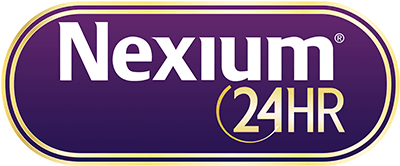Can Heartburn Cause a Sore Throat?

Have you ever experienced a sore throat when you didn’t have a cold or the flu?
That sore throat might be caused by heartburn.
If stomach acid flows up into your esophagus and throat, it can irritate the lining of your throat and cause symptoms such as a cough, an itchy throat, a sore throat, or a hoarse voice.1
Read on to learn about the link between a sore throat and heartburn, so you won’t mistake your symptoms for allergies or a cold.
What is Heartburn?
Heartburn is most commonly described as a burning sensation in your chest that you feel right behind your breastbone.2 Heartburn is caused by acid reflux, the backflow of acid from your stomach into your esophagus.2
After you chew and swallow, food travels from your throat to your stomach via a tube called the esophagus. The lower esophageal sphincter—a band of muscle around the bottom of your esophagus—opens and closes to allow food to pass through into your stomach. The esophageal sphincter’s job is to keep the contents of your stomach and your esophagus separate.
If your lower esophageal sphincter weakens or relaxes abnormally, then stomach acid can flow up into your esophagus, resulting in symptoms of heartburn.
Heartburn and a Sore Throat
If stomach acid is irritating your throat, you might experience symptoms such as:
- Sore throat
- Persistent cough
- Excess mucus
- Mild hoarseness
- Asthma-like symptoms: wheezing, chest tightening, and difficulty breathing
- Postnasal drip or the sensation of mucus sticking to the throat
- Ear pain
- The sensation of a lump in your throat and difficulty swallowing1
If you are experience a chronic sore throat, please contact your healthcare provider to determine the cause. While acid reflux might be a factor, only a trained professional can make that diagnosis.
How to Manage Heartburn
There are a number of diet and daily living changes you can make to help manage your heartburn.
Avoid Trigger Foods
Avoiding certain foods that trigger your symptoms of heartburn can help alleviate your symptoms. Certain foods and drinks that are known to cause heartburn in some people include:
- Acidic foods like citrus fruits
- Onions
- Spicy food
- Fatty foods
- Fried foods
- Chocolate
- Mint or peppermint flavored foods
- Alcohol
- Carbonated beverages like soda
- Caffeinated beverages like coffee
- Large meals
- Tomato products and ketchup2
If your throat is irritated, you might be tempted to pop a throat lozenge or a cough drop for relief. However, things like hard candies, mouthwash, gargles, gum, throat lozenges, and cough drops may further irritate your throat and stimulate your stomach to produce more acid. Many lozenges contain menthol or eucalyptus oil, which can inflame your sore throat if it’s caused by hearturn.3
Lifestyle Changes
Positive lifestyle changes can help alleviate your symptoms of heartburn. Some of those changes include:
- Wear loose fitting clothes: avoid wearing clothing that fits tightly around your midsection, as this could put additional pressure on your stomach and cause heartburn.
- Quit smoking: nicotine weakens your lower esophageal sphincter and makes it harder for the contents of your stomach to stay separate from your esophagus.
- Exercise at the right time: moderate exercise can help relieve your heartburn, but make sure to wait at least two to three hours after a meal before you start exercising.
- Eat slowly: chewing your food well and taking breaks in between bites decreases your chances of getting heartburn.
- Avoid overeating: overeating can put pressure on your stomach and lead to heartburn. Cut back on portion sizes during your meals or eat smaller meals throughout the day.
- Avoid going to bed with a full stomach: eating your last meal of the day three to four hours before you lie down will decrease your risk or experiencing heartburn at night.
- Maintain a healthy weight: Losing weight if you are overweight has been shown to relieve heartburn. In a study where patients lost 10% or more of their body weight through diet and exercise, researchers found that losing weight significantly reduced heartburn symptoms or completely eradicated them.5
- Raise the head of your bed: keeping your heart over your feet while you sleep will make it harder for acid to flow up into your esophagus.4
- Manage the symptoms of frequent heartburn (heartburn that occurs two or more days a week) with a proton pump inhibitor like Nexium 24HR that turns the acid pumps in your stomach from “on” to “off.”
All day, all night heartburn acid prevention has never been easier with our Nexium 24HR satisfaction guarantee and FSA/HSA eligibility. To find the best place to purchase, use the link below.
Source Citations:
- Could Your Sore Throat Be Caused by Acid Reflux? Mount Sinai Today. https://health.mountsinai.org/blog/could-your-sore-throat-be-caused-by-acid-reflux/. Accessed 9/9/21.
- Heartburn - Symptoms and causes. Mayo Clinic. https://www.mayoclinic.org/diseases-conditions/heartburn/symptoms-causes/syc-20373223. Accessed 9/9/21.
- Laryngopharyngeal Reflux. Michigan Medicine. https://www.uofmhealth.org/conditions-treatments/ear-nose-throat/laryngopharyngeal-reflux. Accessed 9/9/21.
- Heartburn: Causes, Symptoms & Treatment. Cleveland Clinic. https://my.clevelandclinic.org/health/diseases/9617-heartburn-overview. Accessed 9/9/21.
- Weight Loss Can Lead to Resolution of Gastroesophageal Reflux Disease Symptoms: A Prospective Intervention Trial. The Obesity Society Journal. https://www.ncbi.nlm.nih.gov/pmc/articles/PMC3853378/. Accessed 9/9/21.
